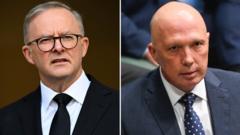Australia's political landscape is bracing for the upcoming federal election set for May 3, where Prime Minister Anthony Albanese seeks to maintain his party's slim majority amidst mounting cost-of-living challenges.
Australia Set for Federal Election on May 3rd

Australia Set for Federal Election on May 3rd
The nation prepares for a pivotal election as Prime Minister Anthony Albanese announces the date following a meeting with the Governor-General.
Australia's federal election is officially scheduled for May 3, as announced by Prime Minister Anthony Albanese after a visit to the Governor-General in Canberra on Friday. With his Labor Party attempting to defend a three-seat majority, the announcement comes amid anticipation of a closely contested race against the Liberal-National coalition led by Peter Dutton.
As the election draws near, opinion polls indicate a competitive environment, suggesting that either party may need to collaborate with independent MPs or minor parties to secure governance. The last election in 2022 saw these smaller groups achieve a historic share of the vote, underscoring their potential influence.
Economic issues, particularly the rising cost of living, are set to dominate the campaign. Voter concerns range from the affordability of housing and groceries to access to healthcare, alongside increasing apprehension regarding immigration and public safety. Climate change, a significant issue in the previous election, remains on the agenda for many Australians.
Albanese has pledged measures to tackle the cost-of-living crisis, including plans for more complimentary doctor visits and modest tax reductions. He positions his rival, Dutton, as a step back for the nation’s progress. In contrast, Dutton argues that the Liberal-National coalition possesses viable solutions for pressing issues, planning to tackle crime and revitalize the economy.
Australia’s electoral system mandates that a party secures at least 76 out of 150 seats in the House of Representatives to achieve a majority government. Historically, political control in Australia has been predominantly held by Labor and the Liberal-National coalition.
Albanese, Australia’s 2022 Prime Minister, succeeded during a turbulent period characterized by leadership turnover, with six prime ministers in eight years. He pledged to foster unity and integrity, striving to tackle climate change—previously a significant campaign issue by mandating enhanced emissions reduction targets. He also aimed for constitutional recognition of Aboriginal and Torres Strait Islander peoples, but faced defeat in a related referendum in 2023.
Amidst global economic pressures intensifying cost-of-living challenges, Albanese's government has come under scrutiny, particularly after purchasing a A$4.3 million home during a housing crisis. Australia's political dynamics are further complicated by Dutton's extensive experience in parliament, which includes roles in crucial ministries and maintaining a hardline stance on various social policies. As the election approaches, both candidates will be tasked with addressing the electorate’s urgent concerns while navigating a complex political landscape.




















